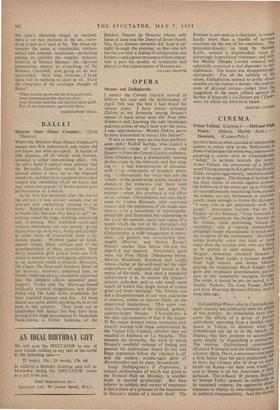OPERA
Strauss and Dallapiccola
I MISSED the Covent Garden revival of Elektra last year and the performance of April 30th was the first I had heard for sixteen years. I have always reckoned Elektra as my favourite among Strauss's operas (I have never seen Die Frau ohnc Schatten) and, knowing the odd shrinkages and expansions of one's taste over the years, I was apprehensive. Would Elektra prove to have diminished in stature like Salome?
It was in many ways an excellent perform- ance under Rudolf Kempe, who cajoled a magnificent range of tonal colour and dynam cs from the Covent Garden orchestra. Erna Schlueter gave a dramatically moving perfoi 1.a.nce in the title-role and her sing- ing w, . a real interpretation of character with r .any refinements of dramatic point- ing. Unfortunately her voice had not the volume or the penetrating quality needed to dominate the orchestra and there were occasit ns—her cursing of her sister, for exampi. —when this produced a sad effect of ant.- cl'max. Chrysothemis was very finely sung by Leonie Rysanek, who conveyed success ully the impression of the single sane charac r in a household of psychopaths, distraught and frustrated but embodying in her vo or; the warmth, sanity and vigour of a youth which the rest of the characters can no longer even understand. Edith Coates's Clytenmestra, a trifle exaggerated in move- ment ,.ad gesture, was nevertheless thor- oughly effective; and Otakar Kraus's Oreses smaller than heroic life-size but dignifi, d and musical. Particularly good were the Five Maids (Mesdames Howe, Howitt, Shacklock, Raisbcck and Leigh) whose chatter at the well-head set the right atmosphere of suspicion and hatred at the
outset of the work. to what a wonderful achievement it is, to sustain the listener's interest unbroken and to add touch upon touch all within this single mood of crazed grief and bitter loathing! No, Elektra was not a disappointment in any way, and to me it remains, within its narrow limits, an un- questioned masterpiece. This score con- tains the minimum of the relaxed, 'golden,' cadence-happy Strauss. Chrysothemis is the only representative of that A flat major- D flat major domain whose territories con- tinually overlap with those administered by the Vienna City Council, whether they are recalled in Idumaca or La Mancha, This remains my favourite, the work in which Strauss's youthful violence of feeling and passion for exploration found its last and finest expression before the 'ripeness is all' and the mellow, middle-aged glow of Rosenkavalier and its many descendants.
Luigi Dallapiq,cola's I1 Prigioniero, a concert performance of which was giyen at the Festival Hall on Monday, is another study in morbid pyschology. But how inferior in subtlety and variety of treatment is this picture of a prisoner of the Inquisition to Strauss's victim of a family feud! The Prisoner is not seen as a character, is indeed hardly more than a bundle of nervous reactions on the eve of his execution. The Inquisitor-Gaoler, ' as sung by Helmut Krebs, seemed a disembodied voice of sickeningly hypocritical sweetness; and only the Mother (Magda Laszlo) retained and splendidly conveyed a real character in this nightmare, The music was disappointinglY spectacular. For all the subtlety of his idiom, Dallapiccola seemed to prefer direct assaults on the listener's nerves—the impres- sions of physical torture—rather than the suggestion of the more refined agonies of Barbey d'Aurevilly's La Torture par l'Esper- ance, on which the libretto is based.
MARTIN COOPER










































 Previous page
Previous page